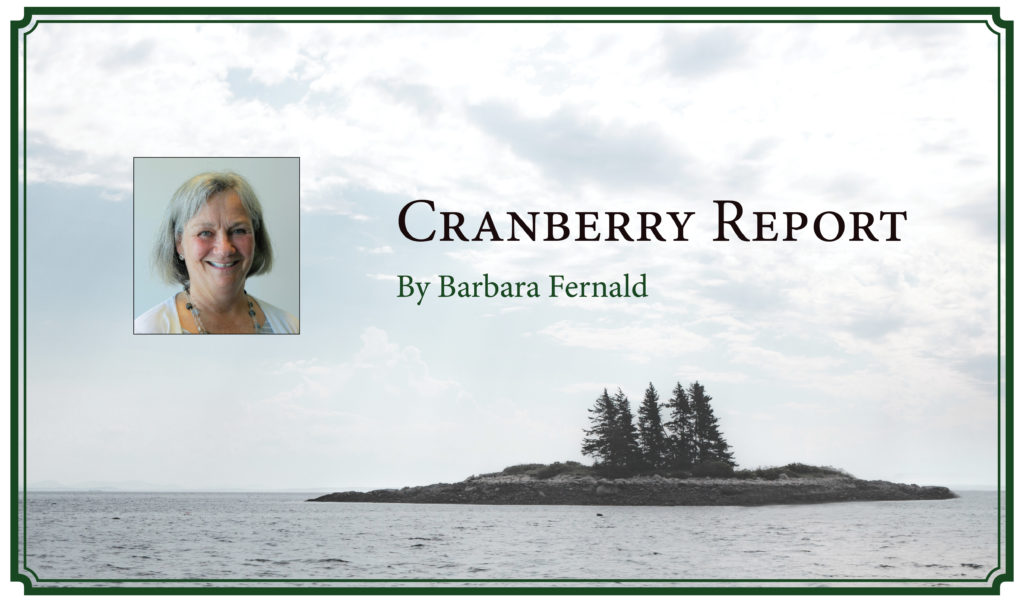By Barbara Fernald
On the first of July, activity on the islands is rolling along at a pace that rivals August. After a rainy, cold May and a rainy, cold June, any day with sun and warmth draws us all outside to catch up with gardening, boating, the beach, or any outside work before the next day of downpours.
I have never been so late in planting my garden, yet some of my earlier-planting friends say everything is slow because of such a cold spring. A late garden isn’t enough to knock me off kilter, but for some reason I feel more frantic this summer, and as I write, it’s not even the Fourth of July. I’m blaming it on the mosquitoes.
They are atrocious this year. I mean, almost biblical. As the rain poured down in May, people would remark, “I hope this doesn’t mean a bad year for mosquitoes.” The winter wasn’t particularly snowy and several of my perennial plants didn’t survive without a snow layer to protect them. We hoped the winter would have the same ill effects on the mosquito population.
When the first mosquitoes showed up in June as uncontentious slow pokes, we let our guards down. The initial batch was soon overtaken by speedy little punks that don’t need shade and travel in hordes. These are more like the mosquitoes we experience in September near the docks. They are a real threat to having a good time outdoors. It’s especially frustrating when we’ve waited so long for nice weather to arrive.
Over the years I’ve built up a tolerance for mosquitos. Even though they bite me, I don’t usually suffer any lasting itchy bumpy effects. Despite that, it’s pretty unnerving to be working in my garden in full sunlight, usually a fairly mosquito-free time, and have eight land on one leg and seven on the other, simultaneously. The only good news about that is I killed five in one slap.
Bruce and I both carry those battery powered mosquito racquets on our walks to and from the old Coast Guard station. The road follows along the back side of a huge salt marsh, just behind the trees, and there are usually plenty of mosquitoes. If there is no breeze we will walk at our fastest pace, waving racquets around our heads, necks, and backs constantly. It gives us a bit of an extra workout and a chance to be ambidextrous.
The racquets can be quite satisfying when they work, snapping and zapping with each electrical mosquito contact, but they are cheaply made and the fine wire mesh gets broken easily. We usually have five or six of these racquets floating around the house in the summer. At any given time only two of them work well. I confess I hide mine when not in use, so I know I’ll have a working model when I step outside the door. I suspect Bruce might be doing the same thing.
Many people have taken to spraying their yards, hiring Orkin to spray every two weeks with a not-as-toxic-as-other-options formula. The guy who does this doesn’t wear a mask, allowing us to believe it might not be such bad stuff.
This year several people have hired another company to spray for mosquitoes with a mixture of oils such as rosemary, peppermint, Geraniol, wintergreen, and white mineral oil. It’s supposed to be safer. Bruce and a few neighbors got together and bought their own sprayer to use with these oils to try to tamp down the overabundance of mosquitoes on our road. We’re still not sure how effective this is since it has rained both times after he sprayed.
In the last 16 years, the town has twice considered a mosquito control plan at the annual town meeting. Both times, in 2003 and in 2013, it was voted down due to concerns about the effects on lobster larvae.
I don’t have any answer for our problems this summer, though I keep hoping the kinder botanical oils will help. My feelings about large scale treatment for mosquito control go back and forth. In the last few weeks it has seemed like a really good idea, but in March, when such an issue would be voted on at town meeting, I might forget how bad it was.
I wonder if constantly waving charged wires near your head affects your mood and memory?
Barbara Fernald lives, writes, and makes jewelry on Islesford (Little Cranberry Island).





